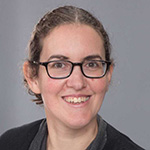Blog Archive: 2019
2019

Gila Silverman
December 9, 2019
This blog post discusses one of the AJS presentation. As part of a roundtable discussion exploring the status of women in Jewish Studies and Israel Studies, Drs. Gila Silverman and Rachel Harris will be presenting their research, which was supported by an HBI Research Award, on the ways that gender impacts career trajectories in Israel Studies.
October 31, 2019
By Michael Moskowitz and Seth Marnin
Noah's arc is long — he lived 950 years. Unfortunately, his arc bends away from grace. Parshat Bereishit concludes and Parshat Noach opens with Noah at his high point. He found favor in the eyes of G-d (Gen. 6:8), he was a "righteous” man… who "walked with G-d." (Gen. 6:9). But just midway through the parsha, Noah tumbles from that exalted perch, becoming intoxicated and unclothed. (Gen. 9:20).

Dalia Wassner
October 24, 2019
By Dalia Wassner
HBI's Project on Latin American Jewish & Gender Studies will come together with the Latin American Jewish Studies Association to host "Engendering Activism: The Multiple Impacts of Latin American Jews," on Oct. 27. The workshop at HBI will explore the role of Latin American Jews who have used visual and performing arts, literature and activism to effect social and political change in their societies.
September 26, 2019
By Rabbi Wendy Amsellem and Rabbi Mike Moskowitz
Speaking about masculinity today, in a favorable way, is so tricky that it is often easier not to discuss it. On Rosh Hashanah, however, when so much masculine G-d language is deployed, it's impossible to ignore it. G-d is a father, a king, a stern and exacting male judge. Our reluctance to discuss positive masculinity only contributes to the paucity of proper role models. Perhaps our discomfort with the language can be channeled into a form of repentance by assiduously exploring the ways that G-d models appropriate masculinity.

Marcia Falk
September 6, 2019
To prepare for the High Holy Days, Fresh Ideas reprints five prayers, some unique to Rosh Hashanah, Kol Nidrey and Yom Kippur liturgy and some that are used during both the high holy days and during the year, from Marcia Falk's book, The Days Between: Blessings, Poems, and Directions of the Heart for the Jewish High Holiday Season, published in the HBI Series on Jewish Women. In her book, Falk recreates the holiday's key prayers from an inclusive perspective, often accompanying them with quotes from the Psalms and prophets.

Amy Powell
August 21, 2019
By Amy Powell
The Israel Trail Procession, a video work by Ayelet Carmi and Meirav Heiman, most recently shown at HBI's Kniznick Gallery, was just acquired by The Israel Museum, a top tourist site in Jerusalem, attracting over 900,000 visitors per year. The work depicts more than 50 people in a procession over parts of the Israel Trail, but with one important caveat: no one is touching the ground.

Rachel Levy
July 29, 2019
By Rachel Levy
In fall 2017, Eyal Rivlin — an Israeli born Hebrew professor at Colorado University at Boulder — received an email from a student asking to matriculate into a Hebrew class. At the bottom of the student's email, in the signature line, Rivlin noticed "they/them" pronouns, indicating that Lior Gross, his new student, did not identify within the gender binary. In Hebrew, nearly all words are conjugated in a feminine or masculine form, depending on the gender of the speaker.

Rachel Levy
July 3, 2019
By Rachel Levy
Growing up, I remember waiting on two important talks from my parents: the sex talk and the Holocaust talk. I had heard vaguely of both, but only understood them as topics that I would learn more about when I was mature enough to understand their magnitude. When the sex talk finally did happen it was short, uninspiring, and I quickly repressed it. However, when I got the Holocaust talk — or talks, as they more realistically were — I felt as if I was being handed down a powerful legacy that came with the responsibility to always remember and never forget.
June 26, 2019
Every summer, HBI welcomes interns from across the country and world who complete original research related to the HBI mission of fresh thinking about Jews and gender worldwide and support the work of scholars affiliated with HBI and Brandeis. During the eight-week program, the interns also attend educational lunch sessions with scholars, visit Jewish sites of interest in the Greater Boston area including Mayyim Hayyim, and a walking tour of Jewish Boston. The Gilda Slifka HBI Summer Internship is supported by a generous gift from Gilda Slifka.
May 3, 2019
By Defne Çizakça
In February 2019, Robert Kraft, the billionaire owner of the New England Patriots and philanthropist, was charged with two counts of soliciting prostitution. The alleged crimes occurred in the Jupiter Spa in South Florida. It now seems probable that the Jupiter and related spas were involved in sex trafficking. Ten have been shut down following recent investigations. The controversial nature of the case, and the involvement of several high profile figures, has sparked a new interest in the workings of the sex trade.

Amy Powell
April 12, 2019
By Amy Powell
The profusion of haggadot designed to create different sorts of experiences for Passover owes a debt of gratitude to Mrs. Lillian Cowen who, in 1904, became the first woman to translate a haggadah into English and to create a seder guide that offered some flexibility. In addition to useful tools such as better translations, ;improved graphics, learned notes, music and illustrations, Mrs. Cowen's haggadah had notes on what was essential and what might be skipped.

Tally Kritzman Amir
March 25, 2019
By Tally Kritzman Amir
The Israeli political realm is gearing up for elections, and some of the voices that dominate the public sphere are women, but not in the ways they have in the past. This year, the traditional roles of models, actresses and politicians seem both blurred and upended.
March 11, 2019
By Layah Lipsker
Getting married under a chuppah is a beloved Jewish ritual, often paired with a festive hora. It is a mitzvah performed with much joy. Sadly, some marriages will end in divorce. There is a mitzvah associated with divorce too, but less well known, and obviously not widely celebrated. But maybe it should be. The ritual around Jewish divorce, the giving and receiving of a get, is a mitzvah that can bring spiritual closure and remind us of one of the sacred themes of Judaism, the gift of autonomous choice and personal freedom.

Amy Powell
February 22, 2019
By Amy Powell
Tucked between the exodus of students at the end of the academic year and before the hum of the summer programs, May 23 started as a slow day. Things got considerably more interesting when curators from the Boston Museum of Fine Arts accompanied by Brandeis professors, visited HBI’s Kniznick Gallery exhibit, "Tamar Paley | A Fringe of Her Own: A Collection of Ritual Objects for Women." That day kicked off a journey that saw the MFA's acquisition of three pieces from the 28-year-old Paley's collection in her first American exhibition, a notable accomplishment for an artist at any stage of her career.
January 31, 2019
By Rabbi Mike Moskowitz and Joshua D. Safer, MD, FACP
Doctors and rabbis are asked a lot of questions; it's a big part of the job. We certainly don't have all of the answers and so we continue to listen, research, and expand our understanding of the issues. And, we have our own questions to help us get closer to the information that shapes our responses to the people who are asking for guidance. There can be no contradiction between science and religion when they both manifest the truth of the Divine intention.

Tally Kritzman-Amir
January 16, 2019
By Tally Kritzman-Amir
Recently, the Israeli ministry of interior announced in Court that a ban on relationships between couples who are migrant workers has led to the deportation of dozens of migrants. This ban requires migrant workers to choose which partner will stay in Israel, as the other is forced to leave the country. Needless to say, in the context of the gender pay gap and gender role assignments in families, this will typically mean that women will leave Israel while the higher earning male partner, who also has more available time to work, remains in Israel.